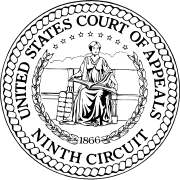Arbitration, in the context of the law of the United States, is a form of alternative dispute resolution. Specifically, arbitration is an alternative to litigation through which the parties to a dispute agree to submit their respective evidence and legal arguments to a neutral third party for resolution. In practice arbitration is generally used as a substitute for litigation, particularly when the judicial process is perceived as too slow, expensive or biased. In some contexts, an arbitrator may be described as an umpire.
Mandamus is a judicial remedy in the form of an order from a court to any government, subordinate court, corporation, or public authority, to do some specific act which that body is obliged under law to do, and which is in the nature of public duty, and in certain cases one of a statutory duty. It cannot be issued to compel an authority to do something against statutory provision. For example, it cannot be used to force a lower court to take a specific action on applications that have been made, but if the court refuses to rule one way or the other then a mandamus can be used to order the court to rule on the applications.
An interlocutory appeal, in the law of civil procedure in the United States, occurs when a ruling by a trial court is appealed while other aspects of the case are still proceeding. Interlocutory appeals are allowed only under specific circumstances, which are laid down by the federal and the separate state courts.
Jed Saul Rakoff is a senior United States district judge of the United States District Court for the Southern District of New York.

Specht v. Netscape, 306 F.3d 17, is a ruling at the United States Court of Appeals for the Second Circuit regarding the enforceability of clickwrap licenses under contract law. The court held that merely clicking on a download button does not show consent with license terms, if those terms were not conspicuous and if it was not explicit to the consumer that clicking meant agreeing to the license.
Fox Film Corp. v. Muller, 296 U.S. 207 (1935), was a case in which the Supreme Court of the United States held that it cannot exert certiorari jurisdiction over a case in which there is an adequate and independent state law ground for the state court's final judgment.

Milan Dale Smith Jr. is an American attorney and jurist serving as a United States circuit judge of the United States Court of Appeals for the Ninth Circuit. Smith's brother, Gordon H. Smith, was a Republican U.S. Senator from 1997 to 2009. Milan Smith is neither a Republican nor a Democrat.
The Extradition Clause or Interstate Rendition Clause of the United States Constitution is Article IV, Section 2, Clause 2, which provides for the extradition of an accused criminal back to the state where they allegedly committed a crime.
Buckeye Check Cashing, Inc. v. Cardegna, 546 U.S. 440 (2006), is a United States Supreme Court case concerning contract law and arbitration. The case arose from a class action filed in Florida against a payday lender alleging the loan agreements the plaintiffs had signed were unenforceable because they essentially charged a higher interest rate than that permitted under Florida law.

Bragg v. Linden Research, Inc., 487 F. Supp. 2d 593, was a ruling at the United States District Court for the Eastern District of Pennsylvania. The case resulted in an important early ruling on the enforceability of an online End User License Agreement (EULA) under American contract law, though it did not ultimately gain influence as a precedent. The ruling also clarified the matter of personal jurisdiction for a dispute involving a user of a website that originates in a different region.

The American Foundation for Equal Rights (AFER) was a nonprofit organization active in the United States from 2009 through 2015. The organization was established to support the plaintiffs in Hollingsworth v. Perry, a federal lawsuit challenging California's Proposition 8 under the Due Process and Equal Protection Clauses of the Fourteenth Amendment to the United States Constitution. AFER retained former United States Solicitor General Theodore B. Olson and David Boies to lead the legal team representing the plaintiffs challenging Proposition 8.
Citizens for Equal Protection v. Bruning, 455 F.3d 859, was a federal lawsuit filed in the United States District Court for the District of Nebraska and decided on appeal by the United States Court of Appeals for the Eighth Circuit. It challenged the federal constitutionality of Nebraska Initiative Measure 416, a 2000 ballot initiative that amended the Nebraska Constitution to prohibit the recognition of same-sex marriages, civil unions, and other same-sex relationships.

Harris v. Blockbuster, Inc., 622 F. Supp. 2d 396, established precedent in the district that when a contract has a clause that authorizes one party to make changes to the "contract" without notification, that it is illusory and hence the entire "contract" is void.

Anonymous Online Speakers v. United States District Court for the District of Nevada, 611 F.3d 653 (2010), is a decision by the Ninth Circuit lowering the standard a plaintiff must meet to compel identification of anonymous posters on the Internet.

In re Zappos.com, Inc., Customer Data Security Breach Litigation, 893 F. Supp. 2d 1058, was a United States District Court for the District of Nevada case in which the Court held that Zappos.com's customers were not held to the browsewrap terms of use because of their obscure nature. The courts also held that the agreement was unenforceable because Zappos had reserved the right to change it at any time without informing the customers. This court decision set a precedent for businesses that use browsewrap agreements and/or include a clause in their agreements that allow them to change the agreements at any time. The decision encouraged conversation on how a business should most fairly display its terms of use and how to avoid unfairness and ambiguity when writing them.

Nguyen v Barnes & Noble, Inc., 763 F.3d 1171, was a United States Court of Appeals for the Ninth Circuit decision in which the Court ruled that Barnes & Noble's 2011 Terms of Use agreement, presented in a browsewrap manner via hyperlinks alone, was not enforceable since it failed to offer users reasonable notice of the terms. The decision set an important precedent on the future design and presentation of online contracts for consumer-facing e-commerce sites.

Blumenthal v. Trump, 949 F.3d 14, was a U.S. constitutional law and federal civil procedure lawsuit heard by Circuit Judges Henderson, Tatel, and Griffith, of the United States Court of Appeals for the District of Columbia Circuit. The case was on appeal from the United States District Court for the District of Columbia, where District Judge Emmet G. Sullivan granted in part and denied in part the President's motion to dismiss for lack of standing, denied the President's motion to dismiss for failure to state claim, and certified interlocutory appeal.
Epic Systems Corp. v. Lewis, 584 U.S. ___ (2018), was a case decided by the Supreme Court of the United States on how two federal laws, the National Labor Relations Act (NLRA) and the Federal Arbitration Act (FAA), relate to whether employment contracts can legally bar employees from collective arbitration. The Supreme Court had consolidated three cases, Epic Systems Corp. v Lewis, Ernst & Young LLP v. Morris (16-300), and National Labor Relations Board v. Murphy Oil USA, Inc. (16-307). In a 5–4 decision issued in May 2018, the Court ruled that arbitration agreements requiring individual arbitration and prohibiting class action lawsuits are enforceable under the FAA, regardless of allowances set out within the NLRA.
Wolf v. Vidal, 591 U.S. ___ (2020), was a case that was filed to challenge the Trump Administration's rescission of Deferred Action for Childhood Arrivals (DACA). Plaintiffs in the case are DACA recipients who argue that the rescission decision is unlawful under the Administrative Procedure Act and the Fifth Amendment. On February 13, 2018, Judge Garaufis in the Eastern District of New York addressed the question of whether the government offered a legally adequate reason for ending the DACA program. The court found that Defendants did not provide a legally adequate reason for ending the DACA program and that the decision to end DACA was arbitrary and capricious. Defendants have appealed the decision to the Second Circuit Court of Appeals.

The writ of mandate is a type of extraordinary writ in the U.S. state of California. In California, certain writs are used by the superior courts, courts of appeal and the Supreme Court to command lower bodies, including both courts and administrative agencies, to do or not to do certain things. A writ of mandate may be granted by a court as an order to an inferior tribunal, corporation, board or person, both public and private. Unlike the federal court system, where interlocutory appeals may be taken on a permissive basis and mandamus are usually used to contest recusal decisions, the writ of mandate in California is not restricted to purely ministerial tasks, but can be used to correct any legal error by the trial court. Nonetheless, ordinary writ relief in the Court of Appeal is rarely granted.









